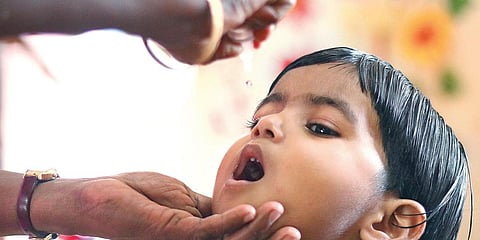

Recently, the World Health Organization declared the African continent free of wild poliovirus; Pakistan and Afghanistan are now the only two countries where wild polio is still endemic (although cases of vaccine-derived polio are on the rise worldwide, primarily due to falling rates of immunisation in children under five.) This is a cheering development, especially at a time when the world is struggling to contain another disease with global reach and dire consequences, Covid-19. It’s also a timely reminder of why we need international organisations like the WHO, which can mobilise experts, civil society and volunteers nationally, regionally and globally, and which can ensure that scientific and medical breakthroughs, research and lessons learned can be transmitted between countries and communities.
It is also a reminder that, as we tackle Covid-19 and prepare for other pandemics that scientists assure us are in the making, we need to involve religious leaders and their institutions early and often in our efforts. Failure to do so has dire implications. In 2015, the WHO issued a stark warning of rising poliomyelitis cases in Somalia, Iraq and Syria. In each of those countries, the virus had previously been eradicated, and was reintroduced from countries where it was still endemic.
The role of religion in containing polio has been a complicated one. On the one hand, vaccine resistance by some religious institutions has been a recurrent challenge for scientists working to contain the disease. In one of the best-known examples, resistance to the vaccine by religious leaders and politicians in parts of northern Nigeria in 2003 led to a resurgence of the disease, which then took years to roll back. This resistance was occasioned by rumours that the vaccines had been deliberately contaminated with anti-fertility drugs and were harming children.
In many countries (including Pakistan, Afghanistan, the US and the Democratic Republic of Congo), religious leaders have often been conduits for misinformation about the potential impacts of vaccines, and have advised their communities and followers to avoid vaccinating their children. At the same time, however, religious leaders and their communities in many countries have been at the forefront of the anti-polio movement: In the Philippines, religious leaders joined civil society organisations and volunteers to organise vaccination drives, leading to thousands of children being protected from disease.
In India, too, religious communities were an integral part of the coalition that eradicated polio from the country, which had previously been one of the worst affected. In Afghanistan, UNICEF works together with interfaith activists and faith leaders to help them communicate effectively with their communities about the virus. When religious communities, especially women, are involved in vaccine drives, success rates increase.
One factor that complicates the relationship between religious institutions and public health initiatives, specifically vaccination drives, is the fact that regions in conflict are also typically the most underserved by public services and tend to be more deprived, which makes reaching those communities even more challenging. In areas where the manipulation of religion is a factor in conflict, for example in areas of Nigeria where Boko Haram is active, in Angola, Afghanistan and others, vaccination drives and other externally driven public health measures can quickly be weaponised to create further mistrust and anti-state paranoia in populations. In 2013, Boko Haram militants murdered nine young women working on polio vaccination programmes in northern Nigeria.
Ownership and trust are often mutually reinforcing: In India, the body responsible for community mobilisation for polio eradication, the Social Mobilization Network, quickly realised that in order to reach poorer communities, the participation of religious leaders was essential. They worked to include religious organisations in the planning, implementation and monitoring of the vaccination programmes, which helped build a sense of trust and ownership in those communities.
This was linked to greater rates of community adoption. Religious leaders are seen as cultural and moral authorities, whose words carry great weight with families considering vaccination. Up-to-the-moment scientific information and exchanges between medical professionals and religious leaders are key to ensuring that they are able to transmit accurate information to their followers. Interreligious action can help build community trust: In many cases, communities felt singled out or unfairly targeted by vaccination drives and other scientific studies, a fear that is not, unfortunately, entirely unfounded. In Pakistan, a CIA-funded fake vaccination drive had the unfortunate effect of leading to a marked rise in vaccine resistance. Ensuring visible and sustained interreligious cooperation around public health can help remove this fear.
As health professionals and governments around the world battle to contain the Covid-19 pandemic, stories are emerging of infection clusters around religious gatherings, for example in South Korea, Austria, India and other places. This has the knock-on effect of increasing hate speech and stigmatisation of religious communities, which then contributes to these communities’ reluctance to engage with state and official actors, building a cycle of mistrust and division. This welcome news from the WHO is a timely reminder that we need to break this cycle, that it takes continuous and intensive effort from all sides, but that it can be done.
Nayana Jayarajan
Vienna-based former journalist who now works on interreligious conflict resolution
(nayana.jayarajan@kaiciid.org)